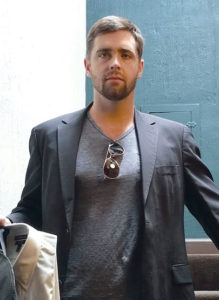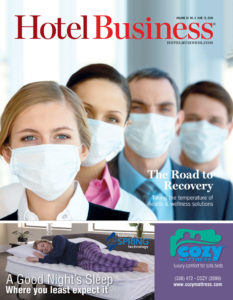 When Alex Kirkwood was 14 years old, he created a business plan: By the time he was 30, he would be working at a major Hollywood studio and have major holdings in real estate. It turns out he was pretty accurate—when he reached 30, he owned a hotel and a vacation-rental property, and was just about to leave his job as a marketing executive at 20th Century Fox. Now he runs the Kirkwood Collection of properties in California.
When Alex Kirkwood was 14 years old, he created a business plan: By the time he was 30, he would be working at a major Hollywood studio and have major holdings in real estate. It turns out he was pretty accurate—when he reached 30, he owned a hotel and a vacation-rental property, and was just about to leave his job as a marketing executive at 20th Century Fox. Now he runs the Kirkwood Collection of properties in California.
Hotel Business caught up with him to discuss his career, boutique hotels and the effects of COVID-19.
Why did you decide to launch the Kirkwood Collection? My career started at 20th Century Fox producing creative content in the film industry. Developing boutique hotels is a holistically similar endeavor as the results of each are an experience to a viewer or a guest. Both patrons walk away with a little different—and hopefully better—perspective than when they walked in. I co-acquired and co-developed The Palm Springs Hotel with industry relationships I had cultivated at Fox.
A few years later, I left Fox to pursue hotel development full time, and three years later, I am proud to have grown our family-owned and operated Kirkwood Collection to a portfolio of five properties and more than 40 employees in iconic California destinations such as Santa Barbara, Palm Springs, Rancho Mirage, San Luis Obispo Wine Country, and our headquarters in Culver City.
The newest addition to our portfolio is the design-driven Hideaway Santa Barbara, which introduces a new standard of understated luxury to the area. Housed in a 1908 California craftsman, the intimate hotel comprises deluxe guestrooms and spacious suites in a great location near The Funk Zone and ocean.
How is the Kirkwood Collection different from other boutique properties? When we launched Kirkwood, we set out to create the first branded B&B company that can scale, focusing solely on uniquely boutique and historically significant properties in iconic vacation destinations that offers a signature cooked-to-order complimentary breakfast. With cloud systems, centralized marketing, revenue management, accounting and in-house design development, we are reimagining the historic bed and breakfast concept from a mom & pop business into a modern boutique hotel group with luxury residential amenities.
How has the COVID-19 pandemic affected your business? During the second week of March when cancellations were skyrocketing and RevPAR started falling off a cliff, we immediately pivoted one of our hotels, Garden Street Inn, into a high-impact renovation project. Our amazing staff was willing to step up and learn how to be a painting crew. Our in-house design development team jumped into gear and started specifying new FF&E, tech, and produced a sophisticated new palette to refresh the hotel. Everyone in our company rose to the occasion, and the new product is breathtaking.
Have you made any changes to your operations for the foreseeable future because of COVID-19? We have implemented various changes at the property level to adapt to the current situation. First off, we have instituted a service called Zingle, which interacts with customers pre-, during and post-stay via text. Through Zingle, we can do contactless check-ins, checkouts and concierge services. This allows us to still offer the high level of customer service our guests have come to expect from Kirkwood, while at the same time keeping guests and staff safe.
We have also started to encourage guests to take advantage of our mobile room key service. We launched this when Hideaway opened last year, but it was not commonly used by guests. We see that changing going forward.
How do you think boutique hotels will fare in post-COVID-19 travel? Boutique hotels are in a position to fare the best out of all hotel classes. Hotels with high design, low key counts and unique room types are easier to fill than bigger hotels, especially when you can dynamically yield rates to room types in real time as they book. This is key when most of your business is booking same-day, which is where the market is right now.
In addition to this, the consumer feedback we are getting is that they are seeking out hotels with low interaction rates, which is something a boutique hotel can deliver in a way resort and full-service properties cannot.
STR just issued our April report for one property in our portfolio where enough of the hotels in the area remained open and able to submit data. Our RevPAR fell 69.6% year-over-year while the larger hotels in the area fell 93.3%. They will need to regain 15x current RevPAR while we only need to regain 3.3x current RevPAR, giving us an advantage. We are finishing out May only down in the 35-45% range.
You have both hotels and vacation rentals in your portfolio. Do you see a difference in how each category might recover? Hotels will recover much faster because of the ability to sell inventory on a single-night basis versus vacation rentals, which typically require a two to three day minimum and are more of a group commitment.
There may also be a higher degree of trust in hotel housekeeping since we follow CDC and hospital-grade guidelines to assure cleanliness. We are striving to merge the “home away from home” feeling of a vacation rental with the superior service and economy of scale that a hotel brings with our properties.
What do you enjoy most about being in the hospitality industry? Telling a destination’s story through creating an experience with architecture, design and service. With the entire collection, we strive to give each property a sense of place and enjoy seeing our guests discover the amazing destinations our hotels are located in.
What is next for the Kirkwood Collection? We are very close to adding a couple of new additions to the collection—that is all I can say for now. HB

